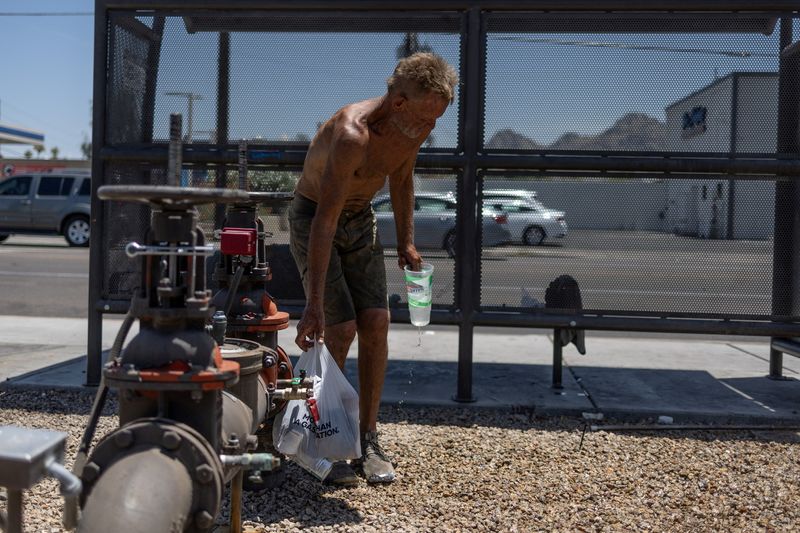
By Granth Vanaik and Arriana McLymore
Extreme heat is causing companies in the United States to change the way they work. One often heard response: work less. Here’s how heat is affecting several major industries and what they’re doing about it: * Construction: Slowing work on construction projects. What normally takes two days could take three or four days if builders pause, estimates Art Hogan, chief market strategist at B. RileyWealth. Changes could include shifting the working day earlier. Delayed projects can also affect the companies that sell goods, but the consequences for companies like DIY store (NYSE:) and Lowe’s are likely limited because builders are buying upfront and the projects aren’t being canceled, Hogan added. And such retailers are driving the demand for air conditioners and fans. *: Oil refineries are designed to withstand high air temperatures, but efficiency decreases. Financial services firm Macquarie Group estimates that extreme weather events cost the oil industry between 1.5% and 2% of refinery production annually. “Temperature matters a lot,” said Vikas Dwivedi, global energy strategist at Macquarie. Refineries in warm climates are limiting the time employees are outside, setting up hydration stations and moving their work shifts to cooler hours earlier in the day. Austin Lin, a former refinery worker and now an analyst at energy consultant Wood Mackenzie, said he would organize the work so that prospective contractors could start projects immediately, without waiting for orders or briefings. In extreme heat, around 43 degrees Celsius, workers can only work about 30 minutes per hour and need frequent breaks to stay safe. * Retail: Retailers may see increased demand for shorts and other clothing that works well in the heat, in addition to fans and air conditioners. One of the most significant changes in retail in high temperature situations concerns the delivery of items ordered online. Amazon says it adjusts routes on hot days to give drivers more time to cool off and offers drivers drink coolers in vans and water-filled covers that keep temperatures down. The Teamsters union, meanwhile, is using extreme heat to protest workers, saying unions can guarantee better protection. * Transport: heat makes travel more difficult. Airplane wings don’t generate as much lift in heat and there have been reports of flights stuck on the tarmac with temperatures of three degrees Celsius inside. Railroads can limit train speeds because the heat will warp the tracks and damage engines and electrical components. * Manufacturing and storage: Companies with huge buildings often condition the air with systems that are cheaper than the air conditioning used in homes and offices. Fans that expel hot air, mist to cool the work environment and plenty of available water are top responses. Spirit AeroSystems (NYSE:), which makes aircraft parts for Boeing (NYSE:), says its water-cooled system keeps maximum temperatures in its factories around 80 degrees Celsius, and there is no impact on production. * Agriculture: It would take weeks of prolonged heat to reduce yields of recently planted corn and soybean crops in the U.S. Midwest, especially with favorable rains forecast in the coming days, analysts say. Modern row crop agriculture requires few workers in the fields for planting, and newer tractor cabs are air-conditioned, reducing human risks. But in California’s central valley, the grapes are tended by hand. Temperatures can fluctuate tens of degrees Celsius in a few days, and the heat in the grape rows is four to five degrees Celsius hotter than in the surrounding area, some workers estimate. Farmers try to provide both crops and people with extra water and shade. And they have reduced the number of hours worked. * Technology: During heat waves, technology companies need to step up their efforts to cool and protect large data centers, where demand is surging due to the artificial intelligence boom that relies on power-hungry microchips. That could mean using backup generators, which data center operators like Digital Realty (NYSE:) say can remain operational for hours, even days.
(Reporting by Gary McWilliams in Houston, Arriana McLymore in New York, Granth Vanaik, Ananya Mariam Rajesh, Zaheer Kachwala, Aditya Soni and Shivansh Tiwary in Bangalore, Caroline Stauffer in Chicago; Writing by Peter Henderson in San Francisco; Editing by Rod Nickel)


